The English language didn't just spring from nowhere. So who introduced such gems as cojones, meme, nerd and butterfingers?
by: Paul Dickson
Butterfingers
Charles Dickens used the term in his 1836
The Pickwick Papers (more properly called The Posthumous Papers of the Pickwick Club): "At every bad attempt at a catch, and every failure to stop the ball, he launched his personal displeasure at the head of the devoted individual in such denunciations as 'Ah, ah!—stupid'—'Now, butter-fingers'—'Muff'— 'Humbug'—and so forth."
Chintzy
Originally this word meant to be decorated or covered with
chintz, a calico print from India, or suggestive of a pattern in chintz. It was extended to mean unfashionable, cheap or stingy, coming from none other than Mary Ann Evans, better known by her pen name
George Eliot, who wrote in a letter in 1851: "The effect is chintzy and would be unbecoming."
Chortle
Blend of "chuckle" and "snort", created by
Lewis Carroll in
Through the Looking-Glass: "'O frabjous day! Callooh! Callay!' He chortled in his joy." Carroll also coined the term "portmanteau word", for merging two existing words into one new word. In such blending, parts of two familiar words are yoked together (usually the first part of one word and the second part of the other) to produce a word that conveys the meanings and sound of the old ones – smog from "smoke" + "fog", and brunch from "breakfast" + "lunch". Portmanteau itself is a quaint word for suitcase, originally combining the French
porter (to carry) and
manteau (cloak) to make a name for a cloak-transporting suitcase designed for carrying on horseback. Lexicographer Ben Zimmer has noted that the portmanteau "remains perhaps the most popular method of new word formation in English, from slang ('chillax', 'geektastic') to business jargon ('webinar,' 'advertorial')".
Cojones
Testicles in the allegorical sense, representing courage and tenacity. Imported from Spanish by
Ernest Hemingway in his 1932 nonfiction bullfighting opus
Death in the Afternoon: "It takes more cojones," he wrote, "to be a sportsman where death is a closer party to the game."
Debunk
A word created by the novelist, biographer and former advertising copywriter
William E Woodward for the process of exposing false claims. He used it in his 1923 novel
Bunk, in which he also created the term debunker and debunking. Others would later debunk Woodward's biographies of George Washington and Ulysses S Grant, which attempted to debunk great figures of history but were generally dismissed as exercises in cynicism and little else.
Doormat
As a metaphor applied to a person upon whom other people "wipe their boots". First used in this sense by Dickens in
Great Expectations: "She asked me and Joe whether we supposed she was door-mats under our feet, and how we dared to use her so."
Eyesore
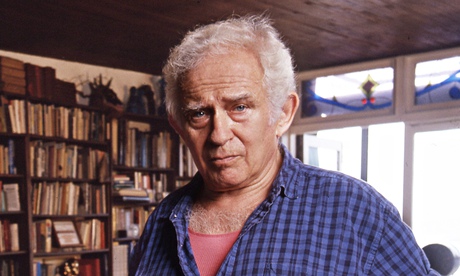 Norman Mailer: identified factoids way back in 1973. Photograph: Elena Seibert/Corbis
Norman Mailer: identified factoids way back in 1973. Photograph: Elena Seibert/Corbis
Factoid
A term created by
Norman Mailer in 1973 for a piece of information that becomes accepted as a fact, although it is not actually true; or an invented fact believed to be true because it appears in print. Mailer wrote in
Marilyn: "Factoids … that is, facts which have no existence before appearing in a magazine or newspaper, creations which are not so much lies as a product to manipulate emotion in the Silent Majority." Lately, factoid has come to mean a trivial fact. That usage makes it a contranym (also called a Janus word) in that it means both one thing and its opposite, such as cleve (to cling or to split) or sanction (to permit or to punish).
Feminist
One who advocates social, political and all other rights of women equal to those of men. Created by Alexandre Dumas (fils) in 1873 as féministe, translated as feminist by G Vandenhoff and identified in his translation as a neologism: "The feminists [Vr. féministes] (excuse this neologism) say, with perfectly good intentions, too: All the evil rises from the fact that we will not allow that woman is the equal of man."
Gremlin
Coined by the Royal Naval Air Service sometime during the first world war, this word was made known by a children's book called The Gremlins: A Royal Air Force Story, written in 1943 by Roald Dahl. According to the story, a gremlin is a small creature that causes mechanical problems in aircraft. After 1943, gremlins were blamed by Allied aircraft personnel for various mechanical and engine problems during the second world war. The name was bestowed on a
small car by American Motors, but given its association with mechanical problems, it was replaced by Spirit in 1978.
Honey trap
A ploy in which an attractive person, usually a woman, lures another, usually a man, into revealing information; by extension, a person employing such a ploy. The term first came into play in 1974 in novelist
John le Carré's
Tinker Tailor Soldier Spy: "You see, long ago when I was a little boy I made a mistake and walked into a honey-trap."
International
Litterbug
Word coined by Alice Rush McKeon, a fierce and early advocate of highway beautification … Her 1931 book The Litterbug Family was instrumental in passing the first billboard-control law in her home state of Maryland.
Meme
The fundamental units of culture, like DNA. First coined in 1976 by the evolutionary biologist
Richard Dawkins, a meme, according to one neat summation, "represents ideas, behaviours or styles that spread from person to person. It can be a trendy dance, a viral video, a new fashion, a technological tool or a catchphrase. Like viruses, memes arise, spread, mutate and die."
Microcomputer
A small computer employing microprocessors based on a single chip. In the July 1956 issue of the Magazine of Fantasy & Science Fiction,
Isaac Asimov debuted the term in a story called The Dying Night in this line: "It had become the hallmark of the scientist, much as … the microcomputer that of the statistician."
Muscleman
James Fenimore Cooper's term for a man of superior strength. He first used it in 1838 in
Homeward Bound: "I suppose these muscle men will not have much use for any but the oyster-knives, as I am informed they eat with their fingers." According to the OED, the use of the term to mean a man who uses force to get his way does not come into the
language until 1929.
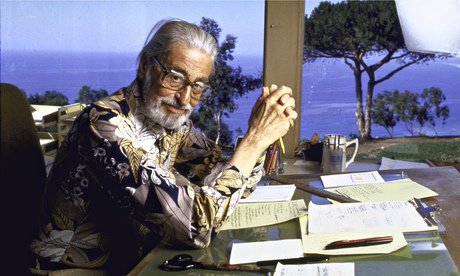 Dr Seuss, AKA Theodore Geisel, in 1984: he wasn't a nerd, but could he have been a preep? Photograph: Mark Kauffman/Time & Life Pictures/Getty Image
Dr Seuss, AKA Theodore Geisel, in 1984: he wasn't a nerd, but could he have been a preep? Photograph: Mark Kauffman/Time & Life Pictures/Getty Image
Nerd
The word first appears in print in 1950 in the children's book
If I Ran the Zoo by American children's writer
Dr Seuss. In the book, a boy named Gerald McGrew makes a great number of delightfully extravagant claims as to what he would do if he were in charge at the zoo where, he insists, the animals housed there were boring. Among these fanciful schemes is: "And then just to show them, I'll sail to Ka-Troo / And bring back an IT-KUTCH, a PREEP, and a PROO, A NERKLE, a NERD, and SEERSUCKER, too!"
The accompanying illustration for nerd shows a grumpy Seuss creature with unruly hair and sideburns, wearing a black T-shirt. For whatever reasons, it-kutch, preep, proo and nerkle have never been enshrined in any dictionary.
Oxbridge
Originally a fictional university introduced in William Makepeace Thackeray's novel
Pendennis: "'Rough and ready, your chum seems,' the Major said. 'Somewhat different from your dandy friends at Oxbridge.'" Later, it was taken as a composite for Oxford and Cambridge as a way of distinguishing those two universities from other British universities.
Pandemonium
For book 1 of his epic poem
Paradise Lost, published in 1667,
John Miltoninvented Pandemonium – from the Greek
pan (all), and
daimon (evil spirit), literally "a place for all the demons" – or, as Milton first expressed in the poem: "A solemn Councel forthwith to be held At Pandæmonium, the high Capital Of Satan and his Peers." Later in the work he calls it the "citie and proud seat of Lucifer". By the end of the century, Pandemonium had become a synonym not just for hell, but, because the devils created a lot of noise, uproar and tumult. In 1828, Edward Bulwer-Lytton applied it to a common location: "We found ourselves in that dreary pandaemonium … a Gin-shop." Today, the term is applied to any scene of disarray, confusion or even heightened activity as in the headline: iPad pandemonium.
Pedestrian
No one had an English word for someone who goes about on foot until 1791, when
William Wordsworth coined the noun.
Robot
Coinage of Czech writer
Karel Čapek's in his 1921 work
R.U.R. (Rossum's Universal Robots). Čapek took the Czech term for "serf labor" and adopted it to the animatrons that we think of today. Asimov invented the words robotic and robotics after Čapek, in 1941.
Sad sack
General term for a misfit. From the name for a cartoon character created for
Yank magazine by American cartoonist George Baker in 1942 for a hapless and blundering army private.
Scaredy-cat
A timid person; a coward. Introduced in 1933 by US author
Dorothy Parker in a short story The Waltz with this line: "Oh, yes, do let's dance together. It's so nice to meet a man who isn't scaredy-cat about catching my beri-beri."
Scientist
The word was coined in 1840 by the
Reverend William Whewell in his book The Philosophy of the Inductive Sciences, which contained a 70-page section on the Language of Science. In it he discusses how the new words of science should be constructed. He then coins the universally accepted term physicist, remarking that the existing term physician cannot be used in that sense. He then moves on to the larger concept. "We need very much a name to describe a cultivator of science in general. I should incline to call him a scientist." The word that scientist replaced was philosopher. An account of this coinage in Word Study, a newsletter published by Merriam-Webster in 1948, noted: "Few deliberately invented words have gained such wide currency, and many people will be surprised to learn that it is just over a century old."
Shotgun wedding
A wedding made in haste or under duress by reason of the bride's pregnancy. The term and the concept were introduced in print by Sinclair Lewis in 1927 in his novel
Elmer Gantry: "There were, in those parts and those days, not infrequent ceremonies known as 'shotgun weddings.'"
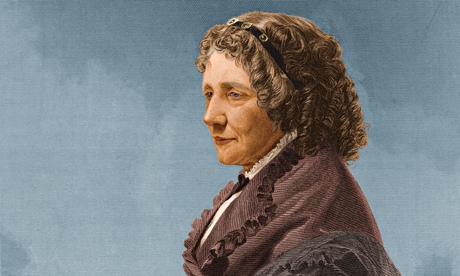 Harriet Beecher Stowe: she knew what it really meant to be sold down the river. Photograph: Hulton Archive
Harriet Beecher Stowe: she knew what it really meant to be sold down the river. Photograph: Hulton Archive
Sold down the river
To suffer a great betrayal; to be destroyed by the bad faith of another, especially one who you trusted. The exact term and the action from which the metaphor derives is from
Harriet Beecher Stowe's
Uncle Tom's Cabin, which describes in heartrending detail the tragic breakup of black Kentucky families who were actually sold to plantations farther down the Mississippi river where conditions were harsher. The term existed before Stowe used it, but she infused it with a sense of tragedy and betrayal.
Tightwad
A miserly person; one who keeps his wad of paper money tightly rolled. This word first appears in 1900 in
George Ade's More Fables, a book in which familiar stories were told in slang.
Unputdownable
The word that supplanted mid-1930s coinage unlaydownable after
Raymond Chandler said of a book in 1947, "I found it absolutely … unputdownable."
Work in progress
Term coined by
Ford Madox Ford for a not-yet-complete artistic, theatrical or musical work, often made available for public viewing or listening. Ford applied it for snippets of James Joyce's Ulysses, which he published as the editor of the
Transatlantic Review. (The term is now used to describe young athletes who are raw but talented.)
Workaholic
In 1971, Dr Wayne E Oates wrote
Confessions of a Workaholic: The Facts about Work Addiction, adding a word to the lexicon of the English language. His concept was that work can become an addiction, akin to alcoholism. Oates remarked in an interview at the time the book was published that the work addict "drops out of the human community" in a drive for peak performance. Oates's use of -aholic opened the drawbridge for a host of new words implying addictions. Although chocoholic and cakeaholic were already in use, in the wake of workaholic, came shopaholics, computerholics and so on.

from: Guardian

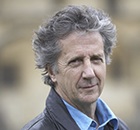
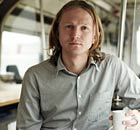

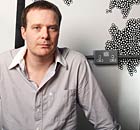




 When you can buy books for cheap on Amazon and research anything online from the comfort of your home, it's easy to dismiss public libraries as dying institutions, crumbling museums for dusty old texts.
When you can buy books for cheap on Amazon and research anything online from the comfort of your home, it's easy to dismiss public libraries as dying institutions, crumbling museums for dusty old texts.